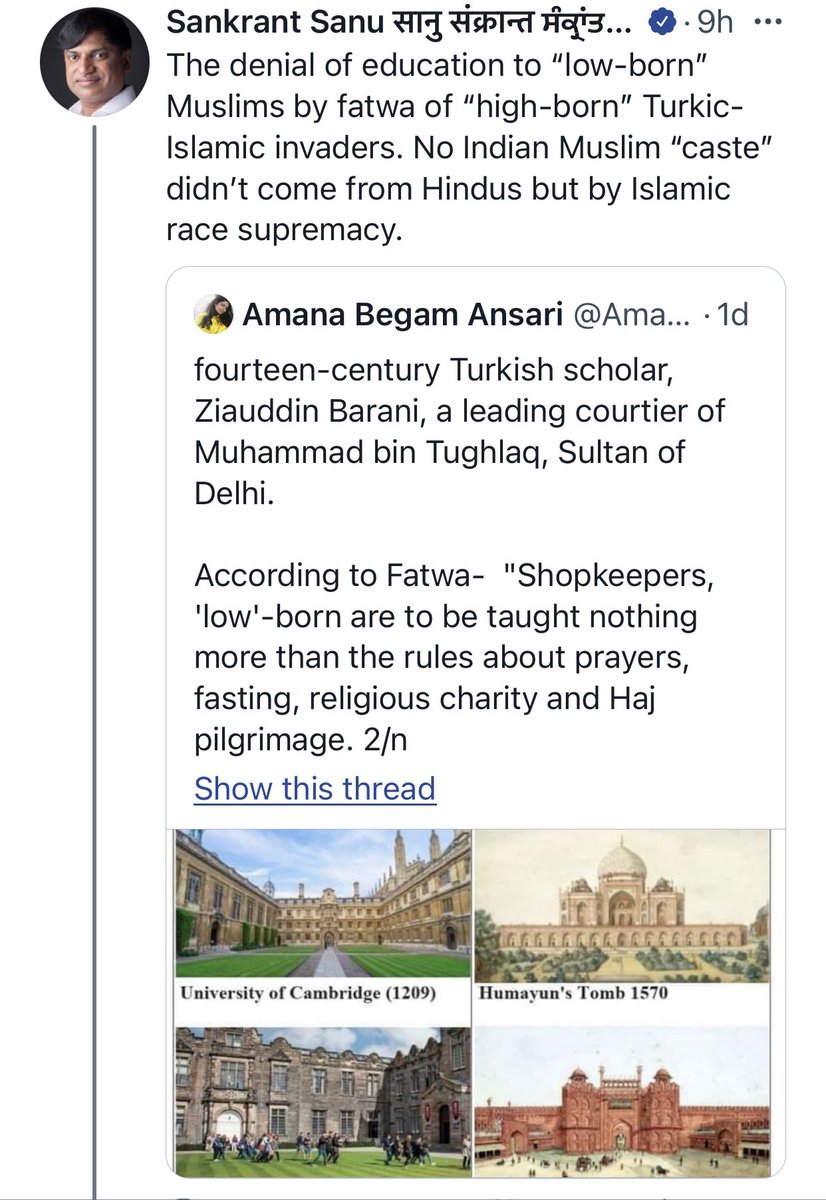How Islam spread to Sylhet (Northeastern Bangladesh) 🧵
educated by his maternal uncle
Source: https://t.co/IQuC317jKN
Source: The Muslim heritage of Bengal by Mohammed Mojlum Khan
More from Islam
As we know, Rightwing Hindutva is the loudest proponent of the “Caste in Muslims” line.
Gullible Pasmanda activists fall for this charade while willing Quislings perpetuate it.
In this thread I give a rebuttal to each point of fitnāh made by this man.
#Thread #PasmandaPolitics
Lie!
This is not an assertion of superiority but a genealogical frame merely tracing descent.
Nor is it comparable to Caste as institutionalised and practised by Vedic Brahminism.
NB: The Prophet (S.A.W.) in fact first took up arms against his own tribe, the Quraish.

The Quran is clear:
“He has ordained for you of religion what He enjoined upon Noah and that which We have revealed to you, [O Muhammad], and what We enjoined upon Abraham and Moses and Jesus - to establish the religion and not be divided therein...”
Surah Ash-Shūrá Quran 42:13
The fact is, the Quran and The Prophet (S.A.W) lay great stress on the characteristics of superiority being righteousness and piety.
Tribal (again, not comparable to the caste system) membership did not denote superiority in religion.
This is a basic difference from Casteism.

What amateurs!
A fatwa is a non-binding legal opinion.
For more on the subject read this interview of Dr. @rezaaslan:
https://t.co/7CcEv3Up0D
As for Barani let us go on to the next tweet in this thread so I can tear your fabrications to shreds.

Gullible Pasmanda activists fall for this charade while willing Quislings perpetuate it.
In this thread I give a rebuttal to each point of fitnāh made by this man.
#Thread #PasmandaPolitics
The \u201cupper caste\u201d status of Sayeed, Sheikh, Quraishi etc among Indian Muslims comes straight from the Hadith where Mohammad claimed certain tribes as \u201cchosen.\u201d@Sanjay_Dixit https://t.co/MDL17iY9oo pic.twitter.com/LbepG6hlqy
— Sankrant Sanu \u0938\u093e\u0928\u0941 \u0938\u0902\u0915\u094d\u0930\u093e\u0928\u094d\u0924 \u0a38\u0a70\u0a15\u0a4d\u0a30\u0a3e\u0a02\u0a24 \u0a38\u0a3e\u0a28\u0a41 (@sankrant) February 27, 2021
Lie!
This is not an assertion of superiority but a genealogical frame merely tracing descent.
Nor is it comparable to Caste as institutionalised and practised by Vedic Brahminism.
NB: The Prophet (S.A.W.) in fact first took up arms against his own tribe, the Quraish.

The Quran is clear:
“He has ordained for you of religion what He enjoined upon Noah and that which We have revealed to you, [O Muhammad], and what We enjoined upon Abraham and Moses and Jesus - to establish the religion and not be divided therein...”
Surah Ash-Shūrá Quran 42:13
The fact is, the Quran and The Prophet (S.A.W) lay great stress on the characteristics of superiority being righteousness and piety.
Tribal (again, not comparable to the caste system) membership did not denote superiority in religion.
This is a basic difference from Casteism.

What amateurs!
A fatwa is a non-binding legal opinion.
For more on the subject read this interview of Dr. @rezaaslan:
https://t.co/7CcEv3Up0D
As for Barani let us go on to the next tweet in this thread so I can tear your fabrications to shreds.

You May Also Like
Speech Delay is most common in children nowadays
In ancient times, our grandparents used to follow typical natural way of caring the needs of a child. All they used were more of natural products than chemical based for the growth of child.

One of major step followed was to feed Gurbach Jadd/ Vasa Kommu/ Acorus Calamus for initiating good speech ability in a child. This stem was needed to babies on Tuesdays and Sundays in mother's milk.
Vasa is feed to baby after the 1st bath on 12th day in week. Weekly only thrice it is fed and named as :
Budhwar - Budhi Vasa
Mangalwar - Vaak Vasa
Ravi Vaar - Aayush Vasa
This stem is burnt and rubbed against the grinding stone in mother's milk or warm water to get a paste

The procedure to make it is in the link
https://t.co/uo4sGp7mUm
It should not be given daily to the child. Other main benefits are
1. It clears the phlegm in child's throat caused due to continuous milk intake. It clears the tracts and breathing is effortless.
2. Digestion
For children who haven't got their speech and is delayed than usual should feed this vasa on these days in week atleast for 6months. Don't get carried away with this dialogue
"Some gain speech little late"
In ancient times, our grandparents used to follow typical natural way of caring the needs of a child. All they used were more of natural products than chemical based for the growth of child.

One of major step followed was to feed Gurbach Jadd/ Vasa Kommu/ Acorus Calamus for initiating good speech ability in a child. This stem was needed to babies on Tuesdays and Sundays in mother's milk.
Vasa is feed to baby after the 1st bath on 12th day in week. Weekly only thrice it is fed and named as :
Budhwar - Budhi Vasa
Mangalwar - Vaak Vasa
Ravi Vaar - Aayush Vasa
This stem is burnt and rubbed against the grinding stone in mother's milk or warm water to get a paste

The procedure to make it is in the link
https://t.co/uo4sGp7mUm
It should not be given daily to the child. Other main benefits are
1. It clears the phlegm in child's throat caused due to continuous milk intake. It clears the tracts and breathing is effortless.
2. Digestion
For children who haven't got their speech and is delayed than usual should feed this vasa on these days in week atleast for 6months. Don't get carried away with this dialogue
"Some gain speech little late"
Recently, the @CNIL issued a decision regarding the GDPR compliance of an unknown French adtech company named "Vectaury". It may seem like small fry, but the decision has potential wide-ranging impacts for Google, the IAB framework, and today's adtech. It's thread time! 👇
It's all in French, but if you're up for it you can read:
• Their blog post (lacks the most interesting details): https://t.co/PHkDcOT1hy
• Their high-level legal decision: https://t.co/hwpiEvjodt
• The full notification: https://t.co/QQB7rfynha
I've read it so you needn't!
Vectaury was collecting geolocation data in order to create profiles (eg. people who often go to this or that type of shop) so as to power ad targeting. They operate through embedded SDKs and ad bidding, making them invisible to users.
The @CNIL notes that profiling based off of geolocation presents particular risks since it reveals people's movements and habits. As risky, the processing requires consent — this will be the heart of their assessment.
Interesting point: they justify the decision in part because of how many people COULD be targeted in this way (rather than how many have — though they note that too). Because it's on a phone, and many have phones, it is considered large-scale processing no matter what.
It's all in French, but if you're up for it you can read:
• Their blog post (lacks the most interesting details): https://t.co/PHkDcOT1hy
• Their high-level legal decision: https://t.co/hwpiEvjodt
• The full notification: https://t.co/QQB7rfynha
I've read it so you needn't!
Vectaury was collecting geolocation data in order to create profiles (eg. people who often go to this or that type of shop) so as to power ad targeting. They operate through embedded SDKs and ad bidding, making them invisible to users.
The @CNIL notes that profiling based off of geolocation presents particular risks since it reveals people's movements and habits. As risky, the processing requires consent — this will be the heart of their assessment.
Interesting point: they justify the decision in part because of how many people COULD be targeted in this way (rather than how many have — though they note that too). Because it's on a phone, and many have phones, it is considered large-scale processing no matter what.















